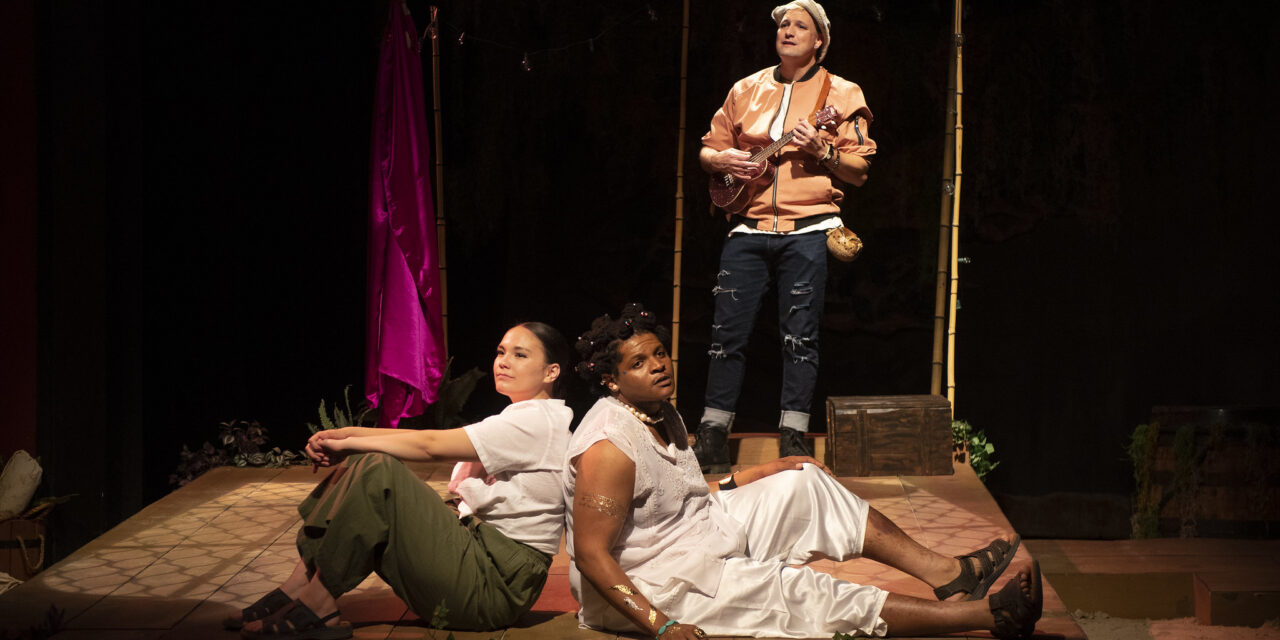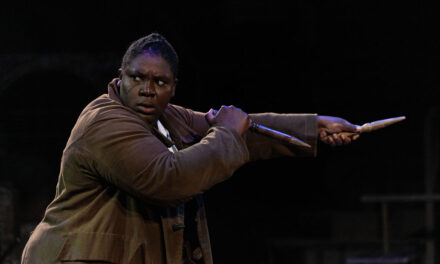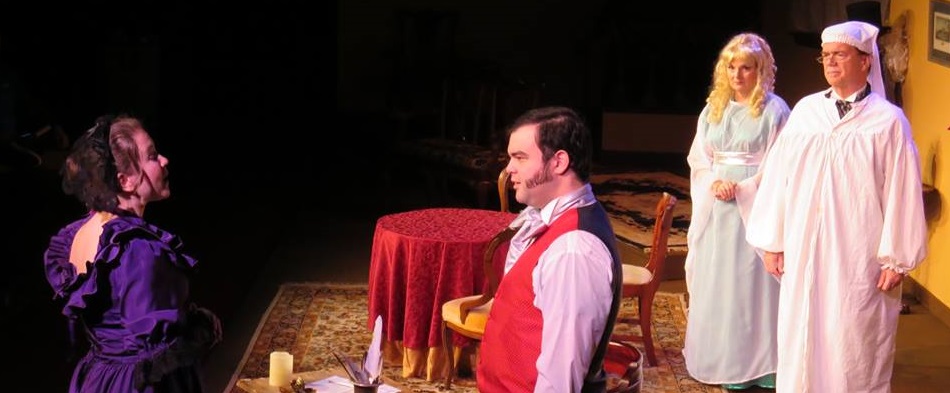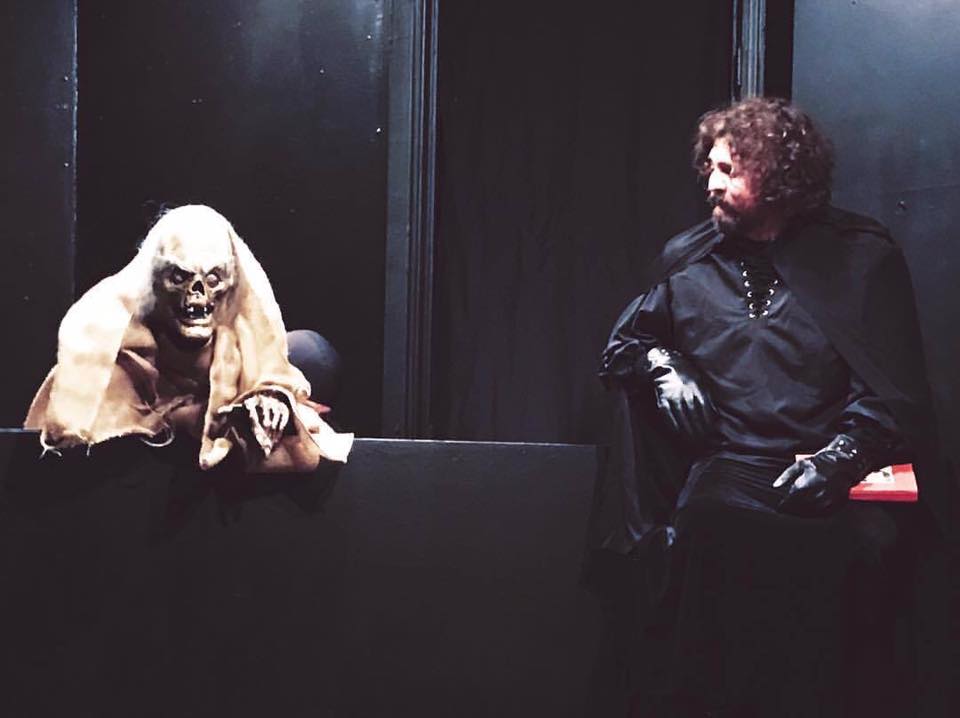Sara Elston, Sa’id Kelly, & Allie Fireel in Twelfth Night. Photo: UofL Theatre
Twelfth Night
By William Shakespeare
Directed by Jennifer Pennington
A review by Keith Waits
Entire contents are copyright © 2021 by Keith Waits. All rights reserved.
Shakespeare used flimsy disguise and cross-dressing as a device more than a few times in his plays, and often the two overlap, as in Twelfth Night. 400 years later the meaning of these tropes is still being discussed.
At a moment in history in which gender is being redefined, such plotlines resonate in new and powerful ways. This has been true at least for the last generation or two, and arguably for much longer, and in her new production for the University of Louisville Theatre Department, director Jennifer Pennington embraces these ideas.
The setting of Illyria has a historical foundation but is here elevated into the realm of fantasy by imagining it as a tropical island paradise populated by gender-fluid characters colorfully rendered in a manner that feels very Caribbean. Kevin Gawley has crafted a set that is equal parts cruise tourist kitsch and Gilligan’s Island. Our Viola is Sara Elston, washed up on the Illyrian shore after a shipwreck, and she is the conduit for the audience, experiencing the unique freedom of this oasis of tolerance and inclusion. Viola may feel it is necessary to dress as a “man”, but you also get the sense that it reveals her true character.
Viola’s masquerade as Cesario is handled in the simplest terms, exchanging skirt for trousers, and Orsino is decidedly androgynous so that their growing attraction never elicits the usual humor of discomfort and the resulting underlying homophobia. Viola/Cesario also draws the interest of Countess Olivia, played by Latrice Richardson as a commanding Haitian queen. This is the heart of why Pennington’s concept mostly works. Both relationships seem much more honest, despite Viola’s deception.
I say mostly because Shakespeare ultimately pairs everyone up in traditional romantic relationships, and all of the subtext and design work can’t completely overcome that. Still, with all of this Illyria’s non-binary sensibility, something like the comic abuse visited upon Malvolio (Nicholas Wills) works perfectly well. It still turns on exploiting vanity and romantic attraction, just without the details of male ego.
But it is a fine line. Malvolio is still male-presenting, although costumer Zhanna Goldentul includes a wonderful floor-length fringe coat that felt a perfect balance of masculine and feminine style, so a viewer can see it less as a departure and more traditional. People tend to go where their mind takes them.
Instead of the Falstaff lite that is common with the character, Jahii Bogard plays Sir Toby Belch as a full on queen, a fabulous gay man in fine linen trousers and a bustier with flowers on the breast topped by a wide-brimmed hat. It deliriously pushes the limits on tone for the production, establishing a high point against some of the more understated work in the ensemble.
His cohorts are Emily Baird’s Sir Andrew Aguecheek, lively of limb and rich in sauciness, and Allie Fireel’s Feste, the minstrel and maker of mischief who sings and plays a bedazzled ukulele. A few actors do double duty; Rachel Meadors as Maria, Lady-in-Waiting to Olivia, and more impactfully, Viola’s brother Sebastian. Her work was thoughtful and well-observed, and Zee Carpenter’s time onstage as Fabian was sound and delightful. Goldentul’s costumes consistently matched the specific look and choices of the actors in each character, and Carpenter’s fetching skirt with suspenders strikes the perfect note for the actor’s gamine presence.
Pennington begins the show with a soft opening during which the ensemble individually meander on to the stage, speaking to each other and the audience out of character. For me, it seemed out-of-place with the highly specific vision at work here, and I failed to see the need for it, but perhaps it warms the crowd a little to the unique concept.
But that was the only misstep, really. Over time, no one production of any of Shakespeare’s plays entirely define our understanding of it, but the best one’s enlarge and expand our relationship to it. I came away from this Twelfth Night cherishing Sara Elston’s carefully calibrated Viola, Jahi Bogard’s outrageous Sir Toby Belch, Emily Baird’s engaging Sir Andrew Aguecheek, and Allie Fireel’s Feste for their fresh insight into these characters, and the ensemble as a whole all do fine work and make sense of the language wih clear intention. And the first scene between Elston and Latrice Richardson was particularly fine.
Featuring Ella Atherton, Emily Baird, Jahi Bogard, Zee Carpenter, Sara Elston, Allie Fireel, Sa’id Kelly, Lloyd King, Rachel Meadors, Latrice Richardson, Thomas Sarr, Nicholas Wills
Twelfth Night
November 11-21, 2021
University of Louisville Theatre Department
University of Louisville Playhouse
South Third Street
Louisville, KY 40208
louisville.edu/theatrearts
Keith Waits is a native of Louisville who works at Louisville Visual Art during the days, including being the host of LVA’s Artebella On The Radio on WXOX 97.1 FM / ARTxFM.com, but spends most of his evenings indulging his taste for theatre, music and visual arts. His work has appeared in LEO Weekly, Pure Uncut Candy, TheatreLouisville, and Louisville Mojo. He is now Managing Editor for Arts-Louisville.com.





